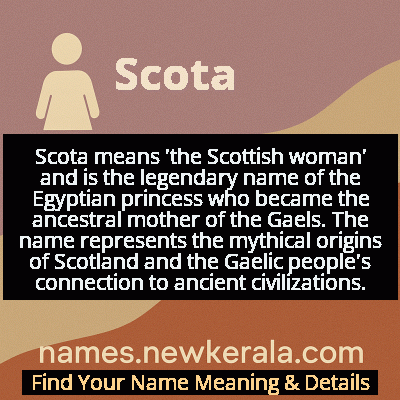Scota Name Meaning & Details
Origin, Popularity, Numerology Analysis & Name Meaning of Scota
Discover the origin, meaning, and cultural significance of the name SCOTA. Delve into its historical roots and explore the lasting impact it has had on communities and traditions.
Name
Scota
Gender
Female
Origin
Irish
Lucky Number
4
Meaning of the Name - Scota
Scota means 'the Scottish woman' and is the legendary name of the Egyptian princess who became the ancestral mother of the Gaels. The name represents the mythical origins of Scotland and the Gaelic people's connection to ancient civilizations.
Scota - Complete Numerology Analysis
Your Numerology Number
Based on Pythagorean Numerology System
Ruling Planet
Uranus (Rahu)
Positive Nature
Strong sense of order, loyal, practical, and disciplined.
Negative Traits
Stubborn, overly serious, rigid, and prone to feeling restricted.
Lucky Colours
Blue, gray.
Lucky Days
Saturday.
Lucky Stones
Blue sapphire.
Harmony Numbers
1, 7, 8.
Best Suited Professions
Managers, engineers, accountants, organizers.
What People Like About You
Dependability, discipline, practicality.
Famous People Named Scota
Scota (legendary)
Mythological Queen
Legendary Egyptian princess who became the mother of the Scottish and Irish Gaels
Scota of Ireland
Mythical Figure
Central figure in Irish mythology who gave her name to Scotland and the Scottish people
Scota the Egyptian
Royal Princess
Daughter of Pharaoh in Irish mythology who founded Gaelic lineages
Name Variations & International Equivalents
Click on blue names to explore their detailed meanings. Gray names with will be available soon.
Cultural & Historical Significance
The legend of Scota represents the deep historical connections between Ireland and Scotland and the Gaelic peoples' desire to trace their lineage to prestigious ancient civilizations. Her story was particularly important in medieval Ireland, where genealogies were crucial to royal legitimacy and cultural identity. The narrative served to elevate the status of Gaelic rulers by connecting them to biblical and classical antiquity, while also explaining the name and origins of Scotland through this maternal lineage. This mythological framework helped shape national identities and cultural pride for centuries.
Extended Personality Analysis
As a legendary founding mother, Scota is typically associated with traits of courage, leadership, and pioneering spirit. She represents the archetype of the strong female leader who embarks on epic journeys and establishes new civilizations. Those named Scota might be perceived as adventurous, determined individuals with a strong sense of heritage and identity. The mythological Scota undertook a massive migration from Egypt to Ireland, demonstrating resilience, vision, and the ability to lead her people to a new homeland.
This suggests personality characteristics of bravery in the face of uncertainty, loyalty to family and community, and the wisdom to guide others through challenging transitions. The name carries connotations of regal bearing, cultural pride, and the strength to build new beginnings while honoring ancestral traditions. Individuals named Scota might be expected to exhibit qualities of independence, cultural awareness, and the capacity to bridge different worlds or traditions, much like the legendary figure who connected Egyptian royalty with Gaelic civilization. The name implies a person of historical consciousness and the courage to embark on significant life journeys.
Modern Usage & Popularity
Scota remains an extremely rare given name in modern times, primarily used by families with strong Irish or Scottish heritage who wish to honor their ancestral connections. It appears occasionally in Ireland, Scotland, and among diaspora communities as a distinctive choice that celebrates Gaelic identity. The name has never ranked in popularity charts and maintains an archaic, almost mythical quality. Contemporary usage is typically deliberate and meaningful rather than following naming trends, often chosen by parents interested in Celtic mythology, history, or seeking a unique name with deep cultural resonance. Its rarity makes it a distinctive choice that stands out while carrying significant historical weight, appealing to those who value tradition and cultural significance over modern popularity.
Symbolic & Spiritual Meanings
Scota symbolizes foundation, migration, and cultural identity. As the mythical mother of nations, she represents the beginning of lineages and the establishment of civilizations. The name carries symbolic weight of journey and transformation - from Egyptian princess to Gaelic matriarch - embodying the idea of carrying one's heritage into new lands and creating new identities while preserving ancient roots. She symbolizes the connection between different cultures and the transmission of tradition across generations and geography. The name also represents feminine power in founding myths and the crucial role women play in establishing and maintaining cultural continuity through major historical transitions, serving as a bridge between ancient civilizations and emerging nations.

